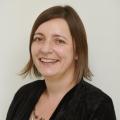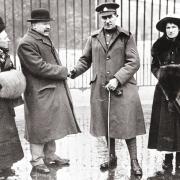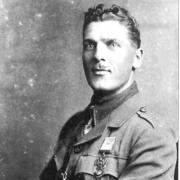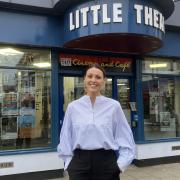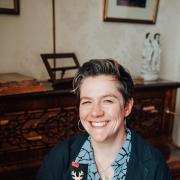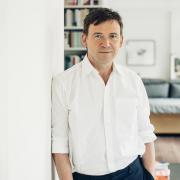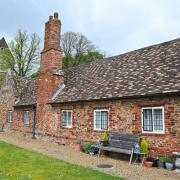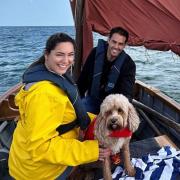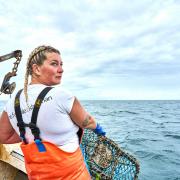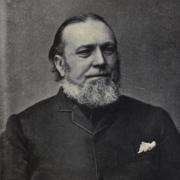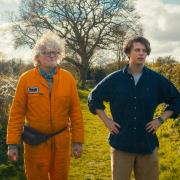Sarah Perry’s latest novel is already being hailed a masterpiece, combining East Anglia landscapes and star-studded heavens with faith, physics and a wonderfully rich whirl of characters, plot, language and ideas.
Enlightenment is a series of dazzling love stories and exploration of the light of science and faith, stars and heavenly bodies. Most of all it is a joy to read, to be whirled into the orbit of this world of gloriously compelling characters and events, set in an East Anglia both familiar and shimmering with the deeply strange.
It is fiction, but illuminated by the internationally-renowned Norfolk writer’s endlessly fascinating background.
Brought up in a family where belief in the Biblical six-day creation of the world co-existed with her scientist and preacher father’s passion for astronomy, Sarah is uniquely placed to tell this story of characters navigating their world with incomplete maps of what is true and not true, what is right and wrong.
Enlightenment is set in the Chelmsford of her childhood, although the geography is not entirely fixed but warped and moulded by time, distance and imagination into her town of Aldleigh. Towards the sea is Aldwinter, the village of Sarah’s bestselling novel, and then television series, The Essex Serpent.
While The Essex Serpent dug down into the fossil-rich earth, Enlightenment looks up. There is a comet on the way and the astronomical event draws into its orbit a cast characters and their intriguing stories. There is chapel-going local journalist Thomas, preacher’s daughter Grace, local boy Nathan, a self-sacrificing aunt whose plain goodness and godliness is no match for the sinister, insinuating banality of evil who arrives with the sickly sweet crackle of satin.
The story is rich and strange, rooted in a reality of streets and trains and pubs and but shaded with ghosts, cosmic coincidences and unsettling folklore. Told in Sarah’s lucid yet luminous style the story seems to glow from the page.
‘I think it’s quite easy to mistake my prose for being a mimicry of Victorian writing but actually that’s not the case,’ she explained. ‘What’s happened is that the influences I had when I was a child and young person are the same influences the Victorian writers had.
‘I was brought up reading the King James Bible, reading Shakespeare, reading the Greeks and so I didn’t have the influences a contemporary writer would have, I have the influences a Victorian writer would have.
‘This book is specifically set in a Strict Baptist background so there is been more biblical language because Thomas is my narrator and he is in a chapel, but the cadences and the language and the idea that I have of what constitutes beauty in writing is all inflected by the stuff I was exposed to when I was young.’
Pop music and television were replaced by classical music but Enlightenment’s focus on astronomy is from her father’s fascination with the night sky. ‘He is a Biblical creationist but one of the things that people forget is that a lot of scientific pursuit was very bound up in religious faith, western and eastern,’ said Sarah. ‘Seculism is very new, science isn’t.
‘If you think about the great Muslim scholars who virtually invented maths, they didn’t find it necessary to unlatch themselves from faith. And even the Enlightenment is to a certain extent ordered by the idea that if God created heaven and earth and is a God of order and reason, and he made us to be creatures of order and reason, we should be able to understand the stars.’
Sarah’s faith is more nebulous than it once was; no longer grounded in every word of the Bible or the rules of a particular denomination.
Enlightenment was launched at Norwich Cathedral and Sarah said: ‘I come to the Cathedral all the time. It offers me a way of communing with God and with faith in a way which is very different from my upbringing, which was very curtailed and strict and ordered by Biblical rules and regulations. I can’t take part in that any more but I definitely do have a faith and there are principles of theology which continue to be very precious to me.’
She and her husband live with their two dogs and a cat in Norwich city centre. They adore the city. ‘We lived in London and had been on a holiday to the north Norfolk coast and came to Norwich on the last day and sat by the river waiting for our train,’ said Sarah. ‘I said, ‘I could live here,’ Three years later we ran away to Norwich. It was like eloping after 12 years of marriage!
‘I will leave Norwich in a coffin and not before, I just feel so lucky to live here.
‘I don’t think I’ve ever known a city which so perfectly balances its terribly beautiful buildings and streets with actually being alive. It’s not a museum piece, it’s a real proper city with things to do and posters and graffiti and cafes.
‘It’s not like Bath which feels a bit preserved in aspic, or Oxford or Cambridge which have beautiful buildings but they don’t belong to everybody. Here the Cathedral and St Peter Mancroft belong to everybody. It feels like it’s all ours.
‘And it’s a writers’ city: Julian of Norwich, Thomas Browne, all the contemporary writers. I’m so happy here.’
She wrote Enlightenment in Norwich through the pandemic.
‘Distance lends enchantment to the view. I wanted to write my Essex, not quite real Essex,’ she said. ‘Being at a distance enables my memories and slightly mythical connection to the landscape to be preserved and amplified. Not just Essex but the whole of the East Anglian flatlands.

‘I feel myself settle in and that I am part of the land rather than standing watching it from a distance.’
The boundaries between herself and her characters are sometimes blurred too. Her heroine in Enlightenment is called Grace, her own middle name, and Sarah stitched her love of sewing into the novel. As a teenager she used to make her own clothes – the long skirts and shawls which girls of the Strict and Particular Baptist Chapel wore. ‘I couldn’t wear trousers or jeans. I still don’t really wear trousers. It’s just not me,’ she said. Grace’s skill as a seamstress is part of the pattern of the novel and Sarah said: ‘Grace has an enormous amount of me in her. Knowing that you are raised strange you either fight it and are very unhappy or you lean into it. I leant into it.’
After finishing the book she shared parts of it with her parents. ‘I checked the astronomy with dad. It was really good fun. The first time I was able to visit after the pandemic we sat at the kitchen table. My mum had her calculator out because she was a maths teacher.’
Today Sarah, who is enormously proud to be Chancellor of the University of Essex, taking over from former Speaker John Bercow, and presiding over graduation ceremonies in scarlet and gold robes, has written a non-fiction book about Essex girls too, and articles about her experience of Graves Disease, an auto-immune condition which causes muscle wastage and bone loss and left her in agony when she ruptured a disc in her spine. ‘It was the worst disc injury the surgeon had ever seen. I had to have emergency neurosurgery on my spine and ended up with a third degree burn on my leg after a hot water bottle burnt hole in my leg because was on so many painkillers,’ she said.
‘I was in a terrible, terrible state. You can’t live with that level of pain. It was deeply traumatising.’
This pain, too, bleeds into Enlightenment. Characters are weighed down with limps and illness. ‘I’m always injuring my characters!’ said Sarah.
But she has worked her way back to health. ‘I am incredibly well now. I am now a weight lifter. I had to learn to walk properly again and I can now pick up 115 kilos and never have any back pain. I’m a miracle! As my surgeon said, I had the worst possible disc injury and the best possible recovery.’
As she drafted and redrafted Enlightenment her fascination with astronomy and physics grew.
‘I wanted to write about my background in some way, faith and loss in some way. In the first tentative forays I didn’t have an organising principle,’ she explained.
Then she spoke to a doctor friend about recurrent illness.
‘He said it will pass and then it will return and then it will pass and then it will return, like an orbit. It was such an illuminating thing to say and it gave me the idea that you could use physics and the motions of the planets as a parable for understanding the way we relate to each other and the way we relate to the world.
‘This is how grief, and happiness, come. You can’t fend them off and you can’t escape them. They will come and they will pass and then will probably come again and then pass.
‘I had already begun to study the stars and was wondering how to incorporate it into the novel and that was one of those amazing moments of inspiration where you find the way of doing it. I will always be grateful.
‘By the end of it I was studying physics and quantum mechanics. I found the physics so thrilling and beautiful.’
She has sold hundreds of thousands of books, translated into 27 languages, since her first novel, After Me Comes the Flood, was published a decade ago. She has won the Waterstones Book of the Year Award and the British Book of the Year Award. But she still finds the most difficult part is the actual writing, translating her visions of people and scenes into the words on the page to recreate her imagined world in the minds of readers. ‘The labour of turning imagination into writing is so awful. It’s coming up against your own incapacity over and over again.’
Even so she has mapped out her next two novels which will explore physics and time, blurring boundaries between past and present.
In her Norwich home she has a high-tech telescope – a sophisticated portal into the night sky. ‘It sets itself in the universe and spins round to find whatever you want to see,’ said Sarah.
Enlightenment also summons the heavens, whirling science and faith, darkness and light, loss and recovery, and the miracle of life and love into the orbit of an all-consuming story which resonates far beyond the final page.
Enlightenment by Sarah Perry is published by Jonathan Cape



